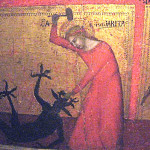We run our website the way we wished the whole internet worked: we provide high quality original content with no ads. We are funded solely by your direct support. Please consider supporting this project.
What is the significance of Deuteronomy 13:1–3?
Moses tells the Israelites that God allowed false prophets to sometimes be correct because “the Lord your God is testing you, to know whether you indeed love the Lord your God with all your heart and soul.”
If God already knows such matters with certainty, Scripture’s inspired description as to why such testings take place (viz. for God “to know…”) cannot be correct. If we believe that Scripture cannot err, it seems we should conclude that God does not necessarily foreknow such matters after all.
Category: Q&A
Tags: Open Theism, Q&A
Topics: Open Theism
Verse: Deuteronomy 13
Related Reading

How do you respond to 2 Samuel 17:14–15?
“Absalom and all the men of Israel said, ‘The counsel of Hushai the Archite is better than the counsel of Ahithophel.’ For the Lord had ordained to defeat the good counsel of Ahithophel, so that the Lord might bring ruin on Absalom.” This passage is sometimes cited to support the view that God ordains all…

How do you respond to Job 1:21?
“…the Lord gave, and the Lord has taken away; blessed be the name of the Lord.” This passage is often quoted as the proper attitude pious people should assume in the face of tragedy, with the implication that all tragedy is the Lord’s doing. This teaching lands hard on the ears of parents who have…

Good From Evil
The Bible is very clear that God has nothing to do with evil. There is “no darkness” in God. (I Jn 1:5). Far from intentionally bringing about evil, God’s “eyes are too pure to look on evil” (Hab. 1:13). All evil, therefore, must be ultimately traced back to decisions made by free agents other than…

Warfare Worldview: A Basic Definition
The warfare worldview is based on the conviction that our world is engaged in a cosmic war between a myriad of agents, both human and angelic, that have aligned themselves with either God or Satan. We believe this worldview best reflects the response to evil depicted throughout the Bible. For example, Jesus unequivocally opposed evils…

How do you respond to Isaiah 53:9?
Speaking of the suffering servant Isaiah says, “[T]hey made his grave with the wicked and his tomb with the rich…” As with most evangelical exegetes, I believe that Isaiah 53 constitutes a beautiful and stunning prophetic look at the person of Jesus Christ. The most impressive feature of this prophecy is that the suffering servant…

Response to the September 11th attacks
Was God Punishing Us? Since the attacks on the World Trade Center and the Pentagon on September 11th, many people have asked the question, “Why did God allow this to happen?” In response, some Christian leaders have suggested that God was punishing our country for reaching an all-time low in moral behavior. As one well-known…
